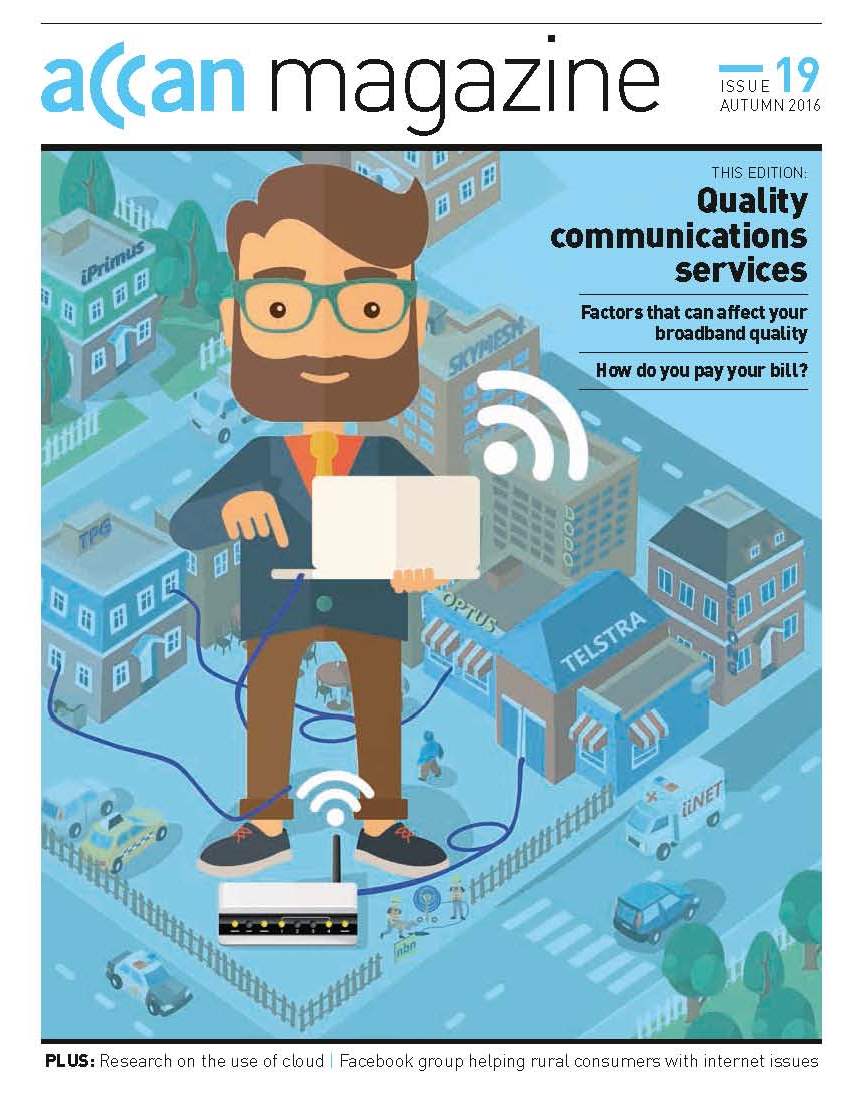- Details
Research from the Australian Communications Consumer Action Network (ACCAN) has found that broadband speeds and performance levels are leaving consumers disappointed with their services. The lack of reliable information on broadband quality for consumers to use when choosing a plan means that it is difficult to make the right choices.
ACCAN's survey found that quality is the third most important factor for consumers in choosing a broadband service, behind price and monthly data allowance. However, consumers appear to be confused by the market. Respondents were split in their opinion on whether providers differ in the level of quality they offer, with 58 per cent of participants agreeing with the statement "You get the same speeds at home as advertised in your plan."
Read more: Broadband speeds and performance leaving consumers disappointed
- Details
ACCAN made a submission to the Department of Communications and the Arts (DoCA) consultation on the Copyright Amendment (Disability Access and Other Measures) Bill 2016 (the Act). We are broadly supportive of the proposed changes, as they overcome some of the barriers faced by people with a disability – and the organisations who provide services to them – in obtaining material in accessible formats.
- Details
 Our Top tips for Phones and Internet consumer information pack consists of six brochures telecommunications consumer issues including:
Our Top tips for Phones and Internet consumer information pack consists of six brochures telecommunications consumer issues including:
- How to use less data on your smartphone
- Tips for picking a good value NBN internet plan
- What affects the quality of my broadband?
- 5 things you need to know about NBN
- How to make a complaint that gets heard
- Telecommunications compensation - What are your rights?
These brochures cover issues that are regularly experienced by many consumers. The brochures are full of useful tips and advice; the pack is designed to be a go to guide to help consumers navigate the often confusing telecommunications market.
- Details
The Australian Communications Consumer Action Network (ACCAN) is holding its Meet the People Forum at Parliament House in Canberra today to highlight important telecommunications consumer priorities for 2016 to Federal Parliamentarians. The Forum will bring the voice of consumers to Canberra, to talk about their experiences with fixed line connection, fault repair and reliability; expectations of broadband performance that are mismatched with actual experience; and the challenge of affordability as a barrier to getting and staying connected.
ACCAN is proposing three key policy initiatives to help address these consumer priorities: a reformed Customer Service Guarantee (CSG) and service reliability benchmarks; independent broadband performance monitoring to inform the market and guide consumer choice; and a review of the current Centrelink Telephone Allowance to match the needs of low income consumers today. These issues and others make up ACCAN's 2015-16 Policy Priorities.
Read more: Reliability, broadband performance and affordability are telco consumer priorities
- Details
 The Department of Communications and the Arts (DoCA) has released the Guidelines for Round 2 of the Mobile Black Spot Programme (MBSP). This means that the competitive bidding process for the Federal subsidy of $60 million by the three mobile network providers has now started.
The Department of Communications and the Arts (DoCA) has released the Guidelines for Round 2 of the Mobile Black Spot Programme (MBSP). This means that the competitive bidding process for the Federal subsidy of $60 million by the three mobile network providers has now started.
ACCAN has compared the Round 1 and Round 2 Guidelines to identify what has changed. The Guidelines list all the criteria that the Federal Government will take into account when assessing whether to subsidise a particular site. Each criterion has a different weighting. Some of the weightings have changed this time round, and importantly there is a new 'remoteness of location criterion.' We are hopeful that this may encourage mobile coverage expanding into more remote areas where it is so badly needed. The main changes to note in the Assessment Criteria are:
Read more: Changes to Mobile Black Spot Programme criteria for Round 2
Write comment (0 Comments)- Details
The Federal Government is planning to amend the Privacy Act to introduce a mandatory data breach notification scheme. The scheme would mean that all government agencies, and entities with an annual turnover of more than $3m, must notify everyone whose personal information was disclosed if they suffer a serious data breach. A data breach would be 'serious' if it results in a 'real risk of serious harm' to an individual or individuals. The scheme would allow people whose personal information has been compromised by a breach to take steps to lessen or avoid potential harms, such as financial loss or identity theft.
Read more: Submission on Privacy Amendment (Notification of Serious Data Breaches) Bill 2015
- Details
Industry lobby, Communications Alliance, has proposed a number of changes to the Telecommunications Consumer Protection Code compliance regime. ACCAN believes the changes may lead to a number of positive changes which should both improve the efficiency of Communications Compliance and provide greater flexibility to smaller suppliers. However, we encouraged the industry group take further steps to address the lack of a publically available, useful performance metrics.
- Details
 Many plans, including pre-paid plans and some month to month plans, on the market now work on a '28 day month' meaning your credit expires after 28 days, rather than the traditional 30 or 31 days of a calendar month. This is not an entirely new practice, but it is a price hike that will affect consumers who prefer pre-paid plans or month to month contracts that do not lock you in. These consumers will get 13 bills during the year rather than 12.
Many plans, including pre-paid plans and some month to month plans, on the market now work on a '28 day month' meaning your credit expires after 28 days, rather than the traditional 30 or 31 days of a calendar month. This is not an entirely new practice, but it is a price hike that will affect consumers who prefer pre-paid plans or month to month contracts that do not lock you in. These consumers will get 13 bills during the year rather than 12.
Twenty-eight day plans are used by Optus, Telstra, Vodafone, Virgin Mobile and amaysim. Optus, Telstra and Vodafone also offer 30 day pre-paid plans.
Read more: What ‘28 day months’ mean for you
Write comment (2 Comments)- Details
The impact of session rounding on mobile data costs
Mobile data is an important resource in our connected lives, but one that is challenging to estimate when selecting a mobile plan. Our mobile data use can vary significantly from month to month depending on many factors such as access to Wi-Fi when at home or work and use while commuting. Another factor that many do not consider is the impact of data session rounding.
- Details

Download: ![]() ACCAN Magazine Issue 19 Autumn 2016.pdf2.28 MB(Note: reading order not accessible)
ACCAN Magazine Issue 19 Autumn 2016.pdf2.28 MB(Note: reading order not accessible)
Download accessible version: ![]() ACCAN Magazine - Autumn 2016 accessible version.docx38.03 KB
ACCAN Magazine - Autumn 2016 accessible version.docx38.03 KB
- Details
 Broadband plans are commonly advertised on headline speed claims which may only be achievable in ideal test conditions and are not what consumers should expect in real world everyday use. Claims are qualified with an elusive list of factors that can affect performance, but this is difficult for consumers to engage with or apply to their service. This issue is heightened with nbn and the promise of faster and better technologies and services.
Broadband plans are commonly advertised on headline speed claims which may only be achievable in ideal test conditions and are not what consumers should expect in real world everyday use. Claims are qualified with an elusive list of factors that can affect performance, but this is difficult for consumers to engage with or apply to their service. This issue is heightened with nbn and the promise of faster and better technologies and services.
Read more: Summary: Independent Broadband Performance Information
- Details
 The ACOSS Poverty in Australia 2014 report indicates that an estimated 2.55 million (13.9%) of Australians are living in poverty. Current Australian research indicates that many low-income consumers are facing financial barriers in getting connected and staying connected to essential telephony and broadband services. Research also indicates that low-income consumers are spending a significantly higher proportion of their income for telecommunications access.
The ACOSS Poverty in Australia 2014 report indicates that an estimated 2.55 million (13.9%) of Australians are living in poverty. Current Australian research indicates that many low-income consumers are facing financial barriers in getting connected and staying connected to essential telephony and broadband services. Research also indicates that low-income consumers are spending a significantly higher proportion of their income for telecommunications access.
